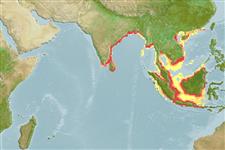Teleostei (teleosts) >
Clupeiformes (Herrings) >
Engraulidae (Anchovies) > Coiliinae
Etymology: Setipinna: Latin, septem = seven + Latin, pinna, -ae = fin.
More on author: Valenciennes.
Environment: milieu / climate zone / depth range / distribution range
Ecology
Marine; brackish; pelagic-neritic; oceanodromous (Ref. 51243); depth range 0 - 50 m (Ref. 189). Tropical; 24°N - 9°S, 76°E - 118°E (Ref. 189)
Indo-West Pacific: Bay of Bengal south to Penang; Thailand south to Java and southern Kalimantan, but no certain records from the Philippines, Sulawesi or Papua New Guinea. Records of this species from about Hong Kong northward refer to Setipinna tenuifilis.
Size / Weight / Age
Maturity: Lm ? range ? - ? cm
Max length : 15.3 cm TL male/unsexed; (Ref. 1479); 22.1 cm SL (female); max. published weight: 37.60 g (Ref. 116958)
Dorsal spines (total): 0; Anal spines: 0; Anal soft rays: 45 - 55. Belly with 20 to 29 + 9 to 14 = 32 to 40 keeled scutes from isthmus to anus. Lower gill rakers with the serrae distinctly clumped. Pectoral filament long, reaching to base of 23rd to last anal fin ray. Scales present on dorsal and anal fins.
A schooling species found mainly in coastal waters, but also entering estuaries (e.g. the Hooghly). More data needed, based on certain identifications, since at least some records must have been based on S. tenuifilis. One of the commonest species of Setipinna.
Life cycle and mating behavior
Maturity | Reproduction | Spawning | Eggs | Fecundity | Larvae
Wongratana, T., T.A. Munroe and M. Nizinski, 1999. Order Clupeiformes. Engraulidae. Anchovies. p. 1698-1753. In K.E. Carpenter and V.H. Niem (eds.) FAO species identification guide for fishery purposes. The living marine resources of the WCP. Vol. 3. Batoid fishes, chimaeras and bony fishes part 1 (Elopidae to Linophrynidae). FAO, Rome. (Ref. 9822)
IUCN Red List Status (Ref. 130435: Version 2024-1)
Threat to humans
Harmless
Human uses
Fisheries: minor commercial
Tools
Special reports
Download XML
Internet sources
Estimates based on models
Preferred temperature (Ref.
123201): 25.5 - 29.3, mean 28.6 °C (based on 646 cells).
Phylogenetic diversity index (Ref.
82804): PD
50 = 0.5039 [Uniqueness, from 0.5 = low to 2.0 = high].
Bayesian length-weight: a=0.00832 (0.00518 - 0.01336), b=2.98 (2.85 - 3.11), in cm total length, based on LWR estimates for this species & (Sub)family-body (Ref.
93245).
Trophic level (Ref.
69278): 3.6 ±0.6 se; based on diet studies.
Generation time: 3.3 ( na - na) years. Estimated as median ln(3)/K based on 1
growth studies.
Resilience (Ref.
120179): Medium, minimum population doubling time 1.4 - 4.4 years (K=0.3).
Fishing Vulnerability (Ref.
59153): Low to moderate vulnerability (32 of 100).
Nutrients (Ref.
124155): Calcium = 236 [79, 741] mg/100g; Iron = 1.74 [0.80, 3.63] mg/100g; Protein = 19.6 [17.6, 21.4] %; Omega3 = 0.516 [0.257, 1.114] g/100g; Selenium = 29.6 [14.1, 68.4] μg/100g; VitaminA = 10.9 [2.6, 55.8] μg/100g; Zinc = 1.95 [0.92, 5.55] mg/100g (wet weight); based on
nutrient studies.
